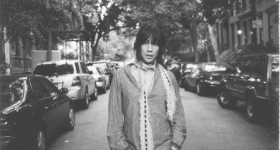Photo Credit: Rahoul Ghose/PBS
Acclaimed filmmaker, Tadashi Nakamura, approaches his work with a musician’s soul. He confesses, “I'm probably much more of a music buff than a film buff. I listen to more music, I read about music way more than I do film, and I think because of this I get more inspiration from music than film.” So one would assume his latest work -- Jake Shimabukuro: Life on Four Strings, an hour-long documentary about the virtuoso ukulele player, airing nationally on PBS on May 10th (check local listings) -- suited him perfectly. However, he admits that when the Center for Asian American Media approached him with the project three years ago, he had some reservations.
First, he was set to begin his M.F.A. program in Film & Television Production at USC. Accepting the gig meant dropping enrollment. This actually wasn’t a difficult decision to make because the prospect of getting paid versus paying tuition was basically a no-brainer.
Second, and more importantly, he wasn’t quite sure he was ready. Despite the fact that his trilogy of award-winning documentary shorts -- Yellow Brotherhood, Pilgrimage (an official selection of the Sundance Film Festival), and Song for Ourselves -- is practically required viewing for Asian American Studies, he had never made an hour-long piece, nor anything set in this decade for that matter. “I knew I could finish a film,” he states, “but I wasn't sure I could craft a narrative.”
Which brings us to the third point: all of Nakamura’s previous work had been overtly political, tackling stereotypes, marginalization, and persecution of Asian Americans. Initially, the intent was to make a concert-based piece about Shimabukuro, but Nakamura wanted to say something more, perhaps about the appropriation of Hawaiian culture and the ethnic diversity of the state. But Nakamura quickly realized, “You can't force something that's not there.”
Ultimately in Life on Four Strings, Nakamura presents an intimate portrait of a humble, unassuming artist: from Jake’s not-so-idyllic youth in Hawaii to Youtube stardom -- late-night talk show performances, packed concert halls, and Sendai, Japan in the aftermath of the devastating tsunami. And in this sense, the personal is indeed political. Nakamura asserts, “The fact that you see an Asian American who seems to be limitless -- it's pushing at least Asian Americans onscreen forward. And also, too, just presenting him as very normal; he is Japanese American, he is from Hawaii, he is from a very Asian American background. It's just taken at face value without making an issue out of it.”
For those that know Shimabukuro just from online clips of his torrid renditions of classic rock songs, the documentary offers depth where cyber-celebrity only achieves reach.
Now that the documentary is set to air, the inevitable question arises: “So what’s next for Tad?” -- the presumption being it must be bigger, more ambitious, perhaps more "mainstream." But despite growing up in Los Angeles amid the allure of Hollywood, his artistic motivations have always remained intensely community-driven, an ethos instilled in him by his parents (writer/producer Karen L. Ishizuka and Robert A. Nakamura, co-founder of Visual Communications, director and professor of UCLA’s Center for EthnoCommunications). “I never had these hopes and dreams of making it; my levels of success were never to be in the industry or on a commercial level. To me, success is having a film in the community that people go to and being written about in the community paper versus the L.A. Times. And it was strictly because of my dad. He would say, ‘The measure of success is how useful your film can be.‘“
But with that said, he understands he must still make a living. “I'll never say I won't sell-out. If selling out means sustaining myself as a filmmaker, then I'll sell the fuck out like real quick, but at the same time hopefully I can bring something to the project.”
For the immediate future, however, it doesn’t sound like he’s headed in that direction. “I feel the need to do smaller, more community-based projects just for my own fulfilment, but at the same time I want to take full advantage of the opportunities given to me.” As of now, his list of prospective projects include: creating online content with his father; directing a documentary on the MeleMurals project, which empowers Hawaiian youth through large-scale graffiti murals; at some point, re-applying for his M.F.A.; and helping his fiancé plan their wedding.
Whatever his next film project might be, music will likely again be a source of inspiration. And when it comes to his art and his politics, it’s a safe bet that he’ll strike the right chord.









Comments